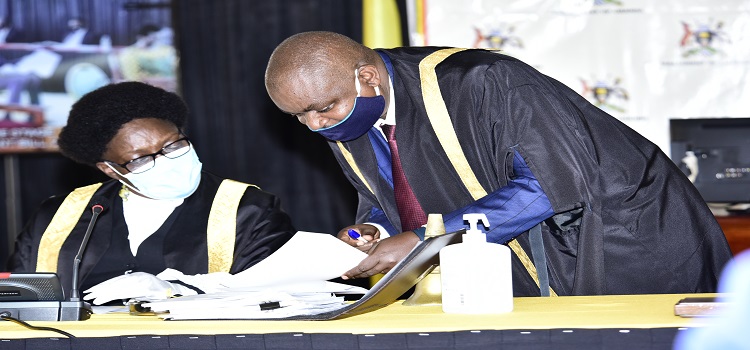Parliament has halted its decision on the proposed mid-term access of savings by contributors to the National Social Security Fund (NSSF) after legislators failed to agree on the group of people and percentage that should be availed.
This followed debate on a report from the Committees of Finance and Gender which proposes that members aged above 45 and have saved for at least 10 years, be allowed to access 20 per cent of their benefits.
The report proposes that mid-term access provides for additional benefits and relief to members of the Fund before they reach the age prescribed by the law.
“A person with a disability who lacks gainful employment or fails to generate income and unable to make contributions to the Fund for a period of not less than one year should access up to 75 per cent of their contributions upon application.” the report states in part.
However in his minority report, Bulamogi County MP,Hon Kenneth Lubogo said that members who lose their employment and remain unemployed for a period of not less than three years should upon application be entitled to 40 per cent of the balance on the member’s account.
In his motion moved earlier,Busongora North MP, Hon William Nzoghu said all contributors should access 20 percent of their savings in light of the economic distress caused by the Covid-19 pandemic.
“Contributors should not die of hunger leaving their savings to the survivors. NSSF has 1.5 million members who contribute over shs1.8 trillion in savings annually and the Fund has over shs11.2 trillion in assets, he said adding that, ‘availing members with their savings will help lessen the negative impact of Covid-19 to over 1.5 million households’.
Soroti District representative, Hon Angelline Osegge said it is first responsibility of the Fund to its savers and not government. She said that the law should be amended to enable people access 20 percent of their money.
Rukungiri Woman MP,Hon Betty Bamukwatsa added that this was the time Ugandans get part of their contributions to help them during the difficult time occasioned by the Covid-19 pandemic.
Soroti County MP, Hon Kenneth Esiangu said the money should be structured in age brackets and based on how long a person has been saved.
“We should let the people access between 20 and 30 per cent; these payments won’t drain the Fund. Every member should get something to alleviate the current suffering,” he said.
Worker representative, Hon Arinaitwe Rwakajara said that anyone who has saved for more than 10 years and is above 45 years should get at least 20 percent of their money.
“Let us not only focus on Covid-19 pandemic, but allow mid-term access to address many other issues which may come in the future,” he said.
After failing to agree on a common position for mid-term access, Speaker Rebecca Kadaga guided that the House stands over the decision to allow MPs more time to harmonise their positions.
“There are certain areas of commonality either to have the status quo of waiting until the age of 50 or the proposal of the partial access to the vote, which isn’t well known until it’s agreed upon here. The contention is that either there is access or not,” she said.
Legislators rejected the proposal that the Fund should be supervised by both the Ministries of Finance and Gender, Labour and Social Development as advised by President Yoweri Museveni.
Despite efforts by the Minister of Gender,Hon Frank Tumwebaze and Minister of State for Planning, Hon David Bahati for the government position to be adopted, a section of MPs led by Dokolo Woman MP, Hon Cecilia Ogwal put up a spirted fight saying that double accounting for funds could not be tolerated. They advocated for the Gender Ministry to solely manage and supervise the Fund.
The NSSF is currently managed by the Ministry of Finance despite its relation to the Labour Ministry. Kadaga also ruled that the decision on this matter is stood over.
Parliament rejected the clause that proposed direct lending by the National Social Security Fund (NSSF) to the government. This followed the committee’s recommendation that this was intended to avoid abuse of member’s funds and conflict of interest.
MPs observed that NSSF already lends to Government and other entities using instruments prescribed in the Uganda Retirement Benefits Regulatory Authority (URBRA) Act and Regulations including, among others; Treasury Bills, Bonds and government securities.
Kadaga ruled that the consideration of the bill will continue on Wednesday, 23 September 2020.




